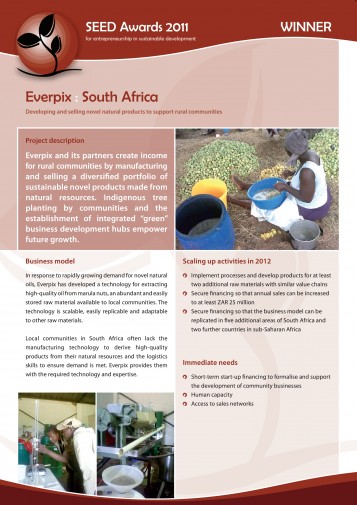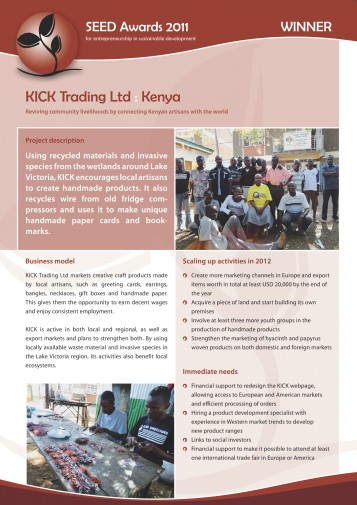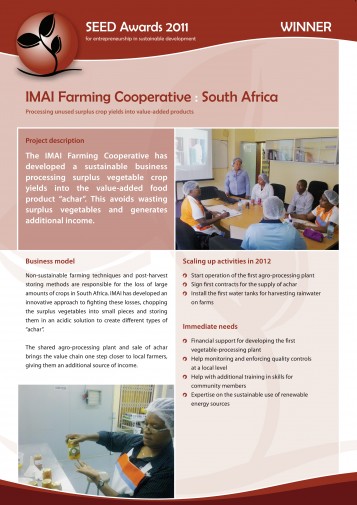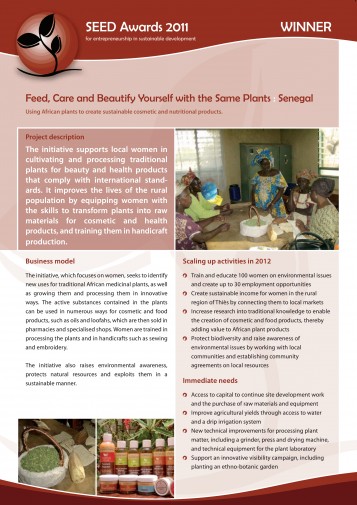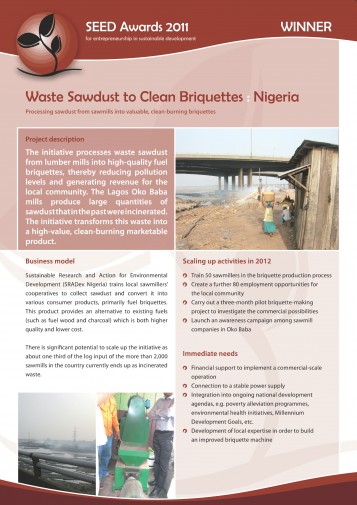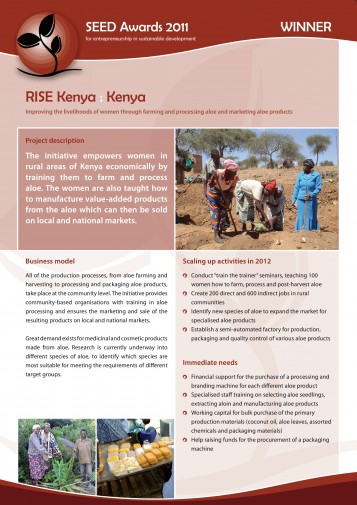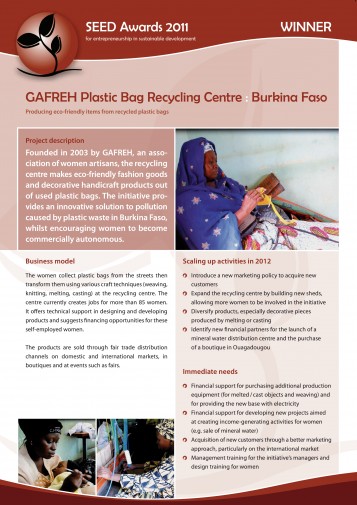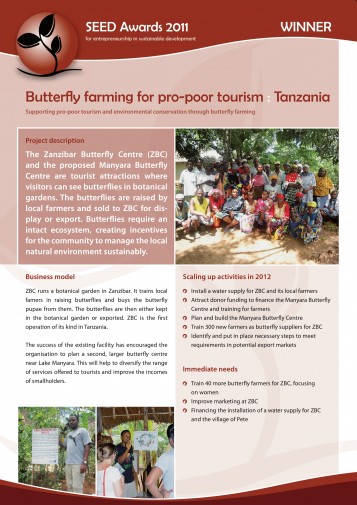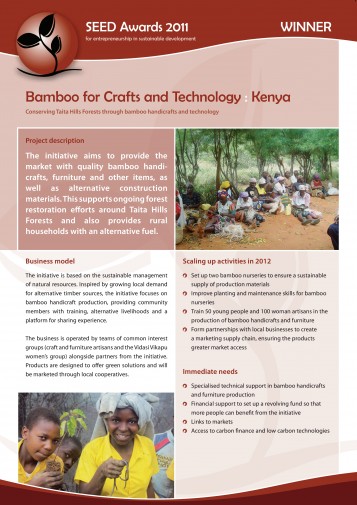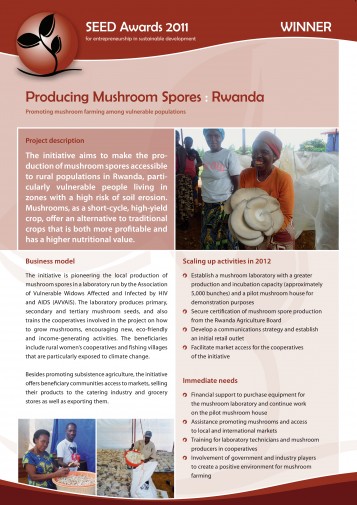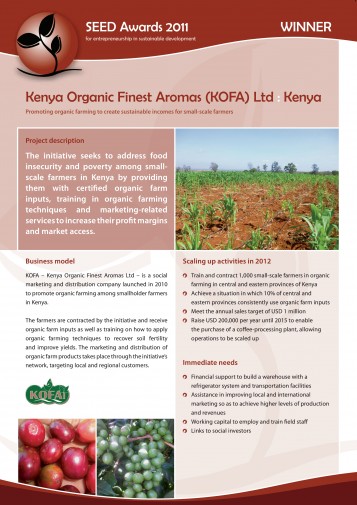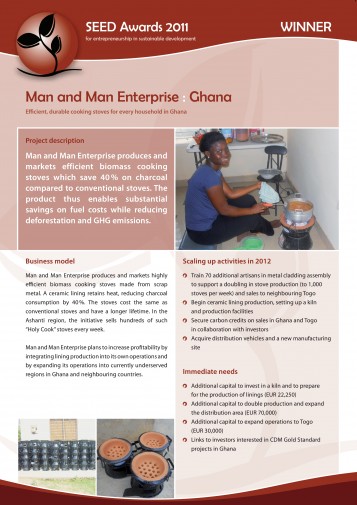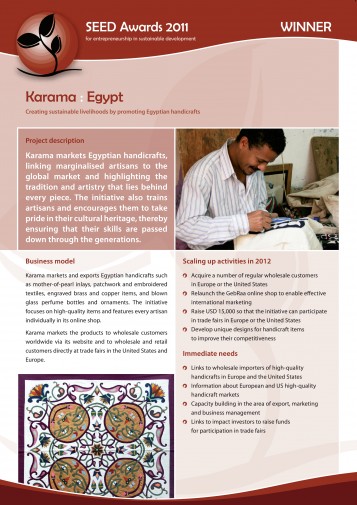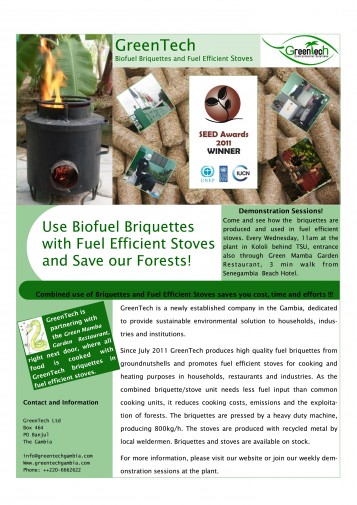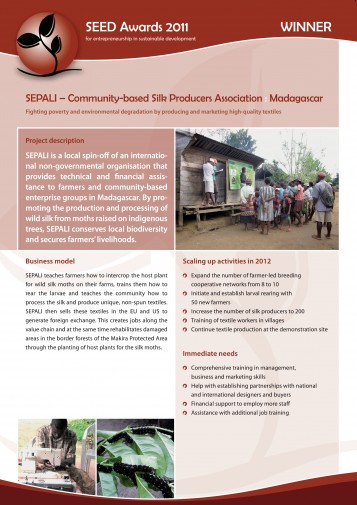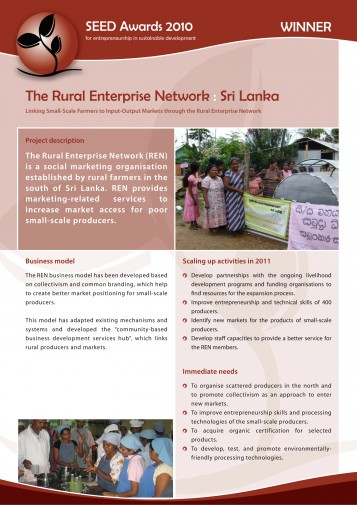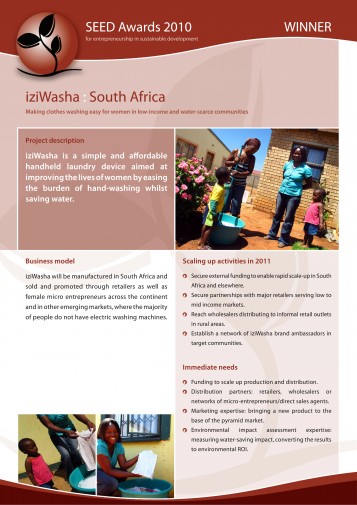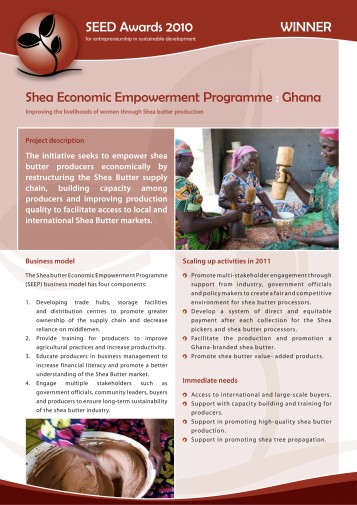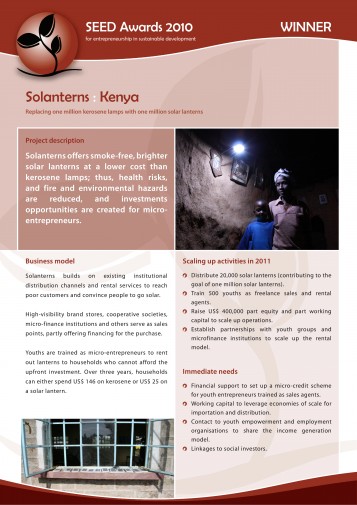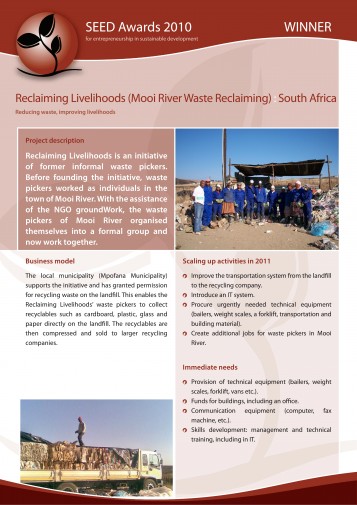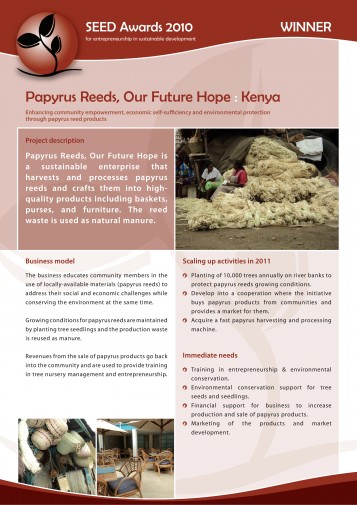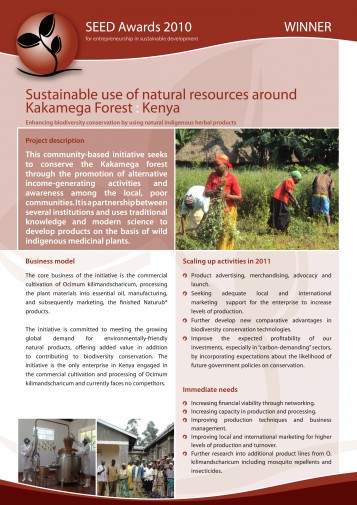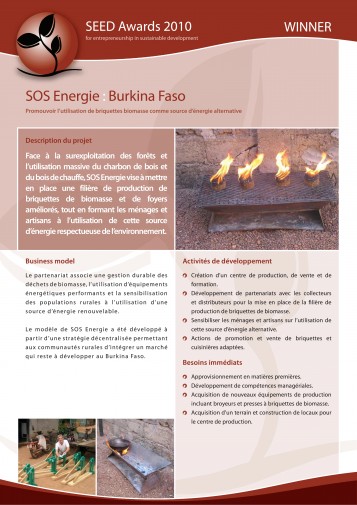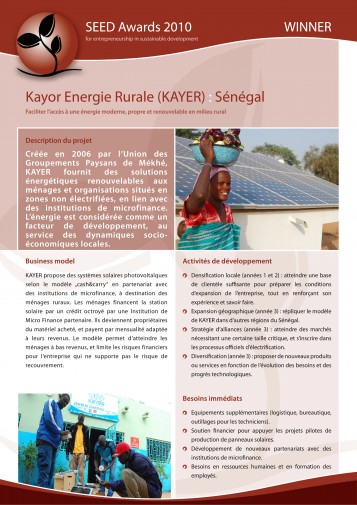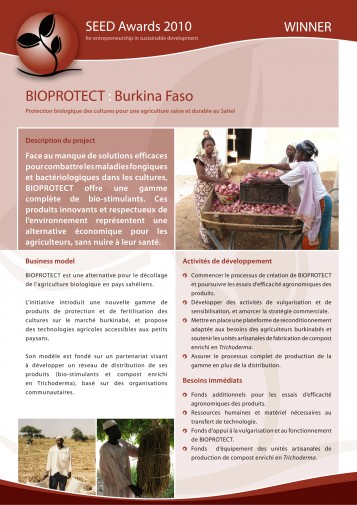Enterprise Brief: Natural tree products and community resource management
Published: 29 August 2011
Everpix and its partners create income for rural communities by manufacturing and selling a diversified portfolio of sustainable novel products made from natural resources. Indigenous tree planting by communities and the establishment of integrated “green” business development hubs empower future growth. Read more
SDGs:







Enterprise Brief: GebRaa
Published: 29 August 2011
Using recycled materials and invasive species from the wetlands around Lake Victoria, KICK encourages local artisans to create handmade products. It also recycles wire from old fridge compressors and uses it to make unique handmade paper cards and bookmarks. Read more
SDGs:









Enterprise Brief: Imai Farming Cooperative
Published: 29 August 2011
The IMAI Farming Cooperative has developed a sustainable business processing surplus vegetable crop yields into the value-added food product “achar”. This avoids wasting surplus vegetables and generates additional income. Read more
SDGs:







Enterprise Brief: Dr Marie Dialo Labortoires
Published: 29 August 2011
The initiative supports local women in cultivating and processing traditional plants for beauty and health products that comply with international standards. It improves the lives of the rural population by equipping women with the skills to transform plants into raw materials for cosmetic and health products, and training them in handicraft production. Read more
SDGs:







Enterprise Brief: Sawdust Entrepreneurial Initiative Among Oko-baba Communities In Lagos
Published: 29 August 2011
The initiative processes waste sawdust from lumber mills into high-quality fuel briquettes, thereby reducing pollution levels and generating revenue for the local community. The Lagos Oko Baba mills produce large quantities of sawdust that in the past were incinerated. The initiative transforms this waste into a high-value, clean-burning marketable product. Read more
SDGs:







Enterprise Brief: RISE Kenya
Published: 29 August 2011
The initiative empowers women in rural areas of Kenya economically by training them to farm and process aloe. The women are also taught how to manufacture value-added products from the aloe which can then be sold on local and national markets. Read more
SDGs:







Enterprise Brief: Centre de Recyclage des Sachets Plastiques du GAFREH
Published: 29 August 2011
Founded in 2003 by GAFREH, an association of women artisans, the recycling centre makes eco-friendly fashion goods and decorative handicraft products out of used plastic bags. The initiative provides an innovative solution to pollution caused by plastic waste in Burkina Faso, whilst encouraging women to become commercially auto nomous. Read more
SDGs:







Enterprise Brief: Butterfly farming for pro poor tourism and environment conservation
Published: 29 August 2011
The Zanzibar Butterlfy Centre (ZBC) and the proposed Manyara Butterfly Centre are tourist attractions where visitors can see butterflies in botanical gardens. The butterflies are raised by local farmers and sold to ZBC for display or export. Butterflies require an intact ecosystem, creating incentives for the community to manage the local natural environment sustainably. Read more
SDGs:





Enterprise Brief: Promoting Bamboo as a Craft and Technology Application with a View to Conserving Taita Hills Forests
Published: 29 August 2011
The initiative aims to provide the market with quality bamboo handicrafts, furniture and other items, as well as alternative construction materials. This supports ongoing forest restoration efforts around Taita Hills Forests and also provides rural households with an alternative fuel. Read more
SDGs:







Enterprise Brief: Project for Producing Edible Mushroom Spores
Published: 29 August 2011
The initiative aims to make the production of mushroom spores accessible to rural populations in Rwanda, particularly vulnerable people living in zones with a high risk of soil erosion. Mushrooms, as a short-cycle, high-yield crop, offer an alternative to traditional crops that is both more profitable and has a higher nutritional value. Read more
SDGs:









Enterprise Brief: Kenya Organic Finest Aromas Ltd (KOFA)
Published: 29 August 2011
The initiative seeks to address food insecurity and poverty among smallscale farmers in Kenya by providing them with certified organic farm inputs, training in organic farming techniques and marketing-related services to increase their profit margins and market access. Read more
SDGs:







Enterprise Brief: Man and Man Enterprise
Published: 29 August 2011
Man and Man Enterprise produces and markets efficient biomass cooking stoves which save 40 % on charcoal compared to conventional stoves. The product thus enables substantial savings on fuel costs while reducing deforestation and GHG emissions. Read more
SDGs:







Enterprise Brief: Karama
Published: 29 August 2011
Karama markets Egyptian handicrafts, linking marginalised artisans to the global market and highlighting the tradition and artistry that lies behind every piece. The initiative also trains artisans and encourages them to take pride in their cultural heritage, thereby ensuring that their skills are passed down through the generations. Read more
SDGs:









Enterprise Brief: GreenTech Company Ltd - fuel briquettes from groundnut shells combined with fuel efficient stoves
Published: 29 August 2011
Since July 2011, GreenTech produces high quality fuel briquettes from groundnutshells and promotes fuel efficient stoves for cooking and heating purposes in households, restaurants and industries. As the combined briquette/stove unit needs less fuel input than common cooking units, it reduces cooking costs, emissions and the exploitation of forests. The briquettes are pressed by a heavy duty machine, producing 800kg/h. The stoves are produced with recycled metal by local weldermen. Briquettes and stoves are available on stock. Read more
SDGs:







Enterprise Brief: SEPALI Madagascar
Published: 29 August 2011
SEPALI is a local spin-of of an international non-governmental organisation that provides technical and financial assistance to farmers and community-based enterprise groups in Madagascar. By promoting the production and processing of wild silk from moths raised on indigenous trees, SEPALI conserves local biodiversity and secures farmers’ livelihoods. Read more
SDGs:







Enterprise Brief: Linking Small-Scale Farmers to Input-Output Markets through Rural Enterprise Network (REN)
Published: 29 August 2010
The Rural Enterprise Network (REN) is a social marketing organisation established by rural farmers in the south of Sri Lanka. REN provides marketing-related services to increase market access for poor small-scale producers. Read more
SDGs:







Enterprise Brief: IziWasha
Published: 29 August 2010
IziWasha is a simple and affordable handheld laundry device aimed at improving the lives of women by easing the burden of hand-washing whilst saving water. Read more
SDGs:







Enterprise Brief: The Shea Economic Empowerment Program (SEEP)
Published: 29 August 2010
The initiative seeks to empower shea butter producers economically by restructuring the Shea Butter supply chain, building capacity among producers and improving production quality to facilitate access to local and international Shea Butter markets. Read more
SDGs:











Enterprise Brief: Solanterns: Replacing 1 Million Kerosene Lanterns with 1 Million Solar Lanterns
Published: 29 August 2010
Solanterns offers smoke-free, brighter solar lanterns at a lower cost than kerosene lamps; thus, health risks, and fire and environmental hazards are reduced, and investments opportunities are created for microentrepreneurs. Read more
SDGs:











Enterprise Brief: Reclaiming Livelihoods – Mooi River Waste Reclaiming
Published: 29 August 2010
Reclaiming Livelihoods is an initiative of former informal waste pickers. Before founding the initiative, waste pickers worked as individuals in the town of Mooi River. With the assistance of the NGO groundWork, the waste pickers of Mooi River organised themselves into a formal group and now work together. Read more
SDGs:













Enterprise Brief: Papyrus Reeds, Our Future Hope
Published: 29 August 2010
Papyrus Reeds, Our Future Hope is a sustainable enterprise that harvests and processes papyrus reeds and crafts them into highquality products including baskets, purses, and furniture. The reed waste is used as natural manure. Read more
SDGs:





Enterprise Brief: Muliru Farmers
Published: 29 August 2010
This community-based initiative seeks to conserve the Kakamega forest through the promotion of alternative income-generating activities and awareness among the local, poor communities. It is a partnership between several institutions and uses traditional knowledge and modern science to develop products on the basis of wild indigenous medicinal plants. Read more
SDGs:







Enterprise Brief: Manufacture and Popularization of Biomass Briquettes
Published: 29 August 2010
Face à la surexploitation des forêts et l’utilisation massive du charbon de bois et du bois de chauffe, SOS Energie vise à mettre en place une filière de production de briquettes de biomasse et de foyers améliorés, tout en formant les ménages et artisans à l’utilisation de cette source d’énergie respectueuse de l’environnement. Read more
SDGs:









Enterprise Brief: Kayor Rural Energy, Rural Electrification by Photovoltaic Solar Energy
Published: 29 August 2010
Créée en 2006 par l’Union des Groupements Paysans de Mékhé, KAYER fournit des solutions énergétiques renouvelables aux ménages et organisations situés en zones non électrifiées, en lien avec des institutions de microfinance. L’énergie est considérée comme un facteur de développement, au service des dynamiques socioéconomiques locales. Read more
SDGs:







Enterprise Brief: Initiative for Promoting and Distributing Bio-Pesticides
Published: 29 August 2010
Face au manque de solutions efficaces pour combattre les maladies fongiques et bactériologiques dans les cultures, BIOPROTECT offre une gamme complète de bio-stimulants. Ces produits innovants et respectueux de l’environnement représentent une alternative économique pour les agriculteurs, sans nuire à leur santé. Read more
SDGs:










